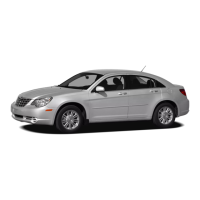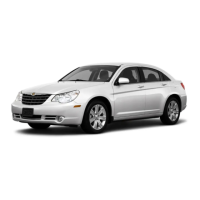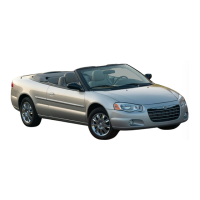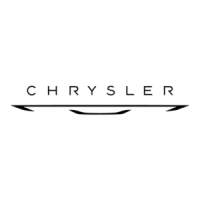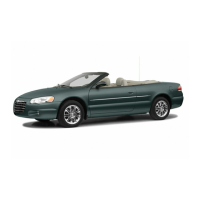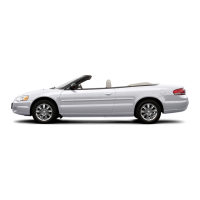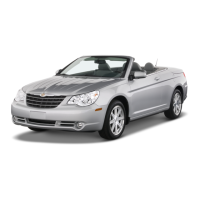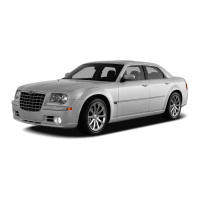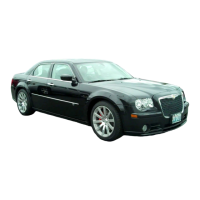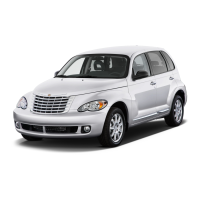Do you have a question about the Chrysler 2010 Sebring Convertible and is the answer not in the manual?
Manual contains WARNINGS against procedures that could result in accident or bodily injury, and CAUTIONS against procedures that could result in damage.
WARNING! Modifications or alterations could affect roadworthiness and safety, leading to serious injury or death.
Immobilizer System prevents unauthorized operation by disabling the engine. Operation is automatic, not armed or activated.
System allows locking/unlocking doors, opening trunk, opening convertible top, lowering windows, or activating Panic Alarm remotely.
Details operation, precautions, and warnings for the power convertible top system.
Can reduce injury risk in rear impact. Adjust top of restraint above top of ear. Use push button to lower.
Adjust seat, mirrors, fasten seat belts. Instruct occupants to buckle up. Warnings about children and animals in vehicles.
WARNING! Never pour fuel or flammable liquids into throttle body air inlet opening.
Driver-interactive transaxle offering six manual ratio changes for more control. Move lever left (-) to downshift, right (+) to upshift.
Covers acceleration, traction, hydroplaning, and precautions for wet, slushy, or icy roads.
Monitors wheel spin. Applies brake pressure and reduces engine power to enhance acceleration and stability.
Requires caution when driving through water. Warnings about flowing/rising water and shallow standing water.
Apply parking brake fully before leaving vehicle. Located in center console. Pull lever up to apply; press center button and lower to release.
Provides increased stability and brake performance by modulating hydraulic pressure to prevent wheel lock-up.
Includes ABS, TCS, BAS, HSA, and ESC. Systems work together to enhance vehicle stability and control.
Assists driver in launching vehicle on incline by maintaining brake pressure for short duration.
Enhances directional control and stability by applying brakes to appropriate wheel to counteract over/under steer.
Details placard location and information on number of people, total weight, tire size, and cold inflation pressures.
Maximum load on tires must not exceed capacity. Adhere to loading conditions, tire size, and inflation pressures on placard.
Total allowable weight of vehicle including driver, passengers, and cargo. Load must not exceed GVWR.
Maximum capacity of front and rear axles. Distribute load evenly. Do not exceed either front or rear GAWR.
Warning about dangers of overloading tires and vehicle components. Can cause failure, affect handling, and shorten service life.
Chart provides maximum trailer weight ratings towable for your given drivetrain (engine/transaxle).
Load trailer with 60-65% weight in front. Tongue weight is 10% of GTW. Consider items on rear axle.
CAUTION! DO NOT flat tow this vehicle. Damage to the drivetrain will result. Ensure all four wheels are off the ground for towing.
Provides guidance on hazard flashers, engine overheating, and related actions.
Take action to reduce overheating potential: slow down on highways; shift to NEUTRAL in city traffic.
Warnings about changing tire near traffic, getting under jacked vehicle, and using jack for service purposes.
Provides procedures for jump-starting with jumper cables or a portable booster pack. Includes warnings.
Connect jumper cables: positive to positive, negative to negative. Start booster vehicle, then discharged vehicle.
Use rocking motion: turn steering wheel right/left, shift between REVERSE/FIRST gear with minimal pedal pressure.
Covers towing with ignition key and without ignition key, including conditions, distance, and speed limits.
Special care needed for LOCK position. Flat bed towing preferred. Use wheel lift or front end dolly if necessary.
Covers engine compartment details, diagnostic systems, emissions programs, replacement parts, dealer service, and maintenance procedures.
Monitors emissions, engine, and transaxle systems. MIL turns on if service is required. Stores diagnostic codes.
Contains required maintenance services determined by engineers. Also lists other components requiring service or replacement.
Checking oil level is crucial for lubrication. Check at regular intervals, preferably when engine is hot and vehicle is level.
Battery fluid is corrosive acid. Battery gas is flammable/explosive. Contains lead. Wash hands after handling.
Check and service AC by authorized dealer at start of warm season. Include cleaning condenser fins and performance test.
Requires unleaded fuel only. Leaded gasoline destroys effectiveness and damages engine. Keep engine tuned.
WARNING! Exhaust gases contain CO, which is colorless/odorless and can kill. Avoid inhaling. Never run engine in closed area.
Warnings about working near fan, hot coolant/steam. Coolant checks and procedures for drain/flush/refill.
Check antifreeze protection annually. Drain/flush/refill if coolant is dirty or rusty. Clean AC condenser.
Use manufacturer's recommended coolant. HOAT antifreeze/coolant recommended. Mix 50% coolant with distilled water.
Check fluid level immediately if brake warning light indicates system failure. Clean area before removing cap. Do not overfill.
Automatic transaxle and differential in single housing. Check fluid level when serviced. Improper level reduces transaxle life.
CAUTION! Failure to follow can cause interior water damage, stains, or mildew. Avoid high-pressure car washes.
Ensure TIPM cover is properly positioned and latched to prevent water entry, which could cause electrical failure.
Use only fuse with correct amperage rating. If fuse blows repeatedly, circuit problem needs correction.
Lists engine oil capacities for 2.4L, 2.7L, and 3.5L engines with recommended SAE grade and API certification.
Lists coolant capacities for 2.4L, 2.7L, and 3.5L engines with recommended antifreeze and mileage/year.
Component-specific fluid/lubricant recommendations for engine coolant, oil, oil filter, spark plugs, and fuel selection.
Contains required maintenance services determined by engineers. Also lists other components requiring service or replacement.
Scheduled Maintenance services in bold type must be done to ensure proper function of emissions control system.
Oil change indicator system reminds you when to take vehicle for scheduled maintenance. 'Oil Change Required' or 'Change Oil' message displayed.
Change oil/filter, rotate tires. Inspect air cleaner filter, brake linings, AC filter (if equipped), CV joints, exhaust system, suspension parts.
Change oil/filter, rotate tires. Inspect air cleaner filter, brake linings, AC filter (if equipped), CV joints, exhaust system, suspension parts.
Change oil/filter, rotate tires. Replace air cleaner filter, spark plugs (2.4L except PZEV). Inspect/replace PCV valve.
Change oil/filter, rotate tires. Inspect air cleaner filter, brake linings, AC filter (if equipped), CV joints, suspension parts.
Change oil/filter, rotate tires. Inspect air cleaner filter, brake linings, AC filter (if equipped), CV joints, exhaust system, suspension parts.
Change oil/filter, rotate tires. Replace air cleaner filter, spark plugs (2.4L except PZEV). Inspect brake linings, AC filter (if equipped), CV joints, exhaust system, suspension parts. Change transaxle fluid/filter.
Change oil/filter, rotate tires. Inspect air cleaner filter, brake linings, AC filter (if equipped), CV joints, exhaust system, suspension parts.
Change oil/filter, rotate tires. Replace air cleaner filter, spark plugs (2.4L except PZEV). Inspect/replace PCV valve.
Change oil/filter, rotate tires. Inspect air cleaner filter, brake linings, AC filter (if equipped), CV joints, exhaust system, suspension parts.
Change oil/filter, rotate tires. Replace spark plugs (all engines). Replace timing belt (3.5L). Flush/replace coolant. Inspect accessory drive belt.
Change oil/filter, rotate tires. Replace air cleaner filter, spark plugs (2.4L except PZEV). Inspect brake linings, AC filter (if equipped), CV joints, exhaust system, suspension parts. Change transaxle fluid/filter.
Change oil/filter, rotate tires. Replace air cleaner filter, spark plugs (2.4L except PZEV).
Provides guidance on obtaining service, contacting customer centers, and reporting safety defects.
Inform NHTSA and manufacturer immediately of defects causing crash, injury, or death. Contact information provided.
| Brand | Chrysler |
|---|---|
| Model | 2010 Sebring Convertible |
| Category | Automobile |
| Language | English |

